Editor’s note: I am not an economist, but I am a keen student of human nature. And throughout history, humans have been motivated by commerce and money to make decisions that are at times rash, illogical, and inhuman. “Up and running at always accelerating speeds over the past 140 years, the remorseless process of dehumanized moneymaking is the globalized economy believed these days to possess the power of divinity. The $73 trillion trading on the world’s computer screens is human energy and desire concentrated as lifeless abstraction, moving at the speed of light in a moral and intellectual vacuum, praying like Aristotle’s “Midas in the fable” for a miracle.” The global trade war is on, although certainly not through any desire of CEOs of multinational companies, as near-daily shifts in tariff policy create market volatility driven by increased costs, confusion, and uncertainty. Uncertainty is almost like white noise at this point, so ubiquitous and constant that we tend to ignore it. But higher costs? That’s anathema to any company. As you know, tariffs are a tax paid by companies that import goods from abroad, which therefore raise costs for businesses. Companies may absorb some of that cost to avoid raising prices for consumers, eroding profits. At a certain point, every company has to make a choice about where and how it will source materials and labor — a decision born of cost, practicality, and desired growth. Milton Friedman made it clear that a business’ primary responsibility is increasing its profits.¹ Those choices become increasingly difficult when the whipsaw of a trade war threatens to upend the status quo, as imbalanced or unfair as some might view international trade. The battle cry of the trade war is “fairness,” which is mistakenly used as a synonym for reciprocity or equality. And as we’ll see, fairness and the need for perspective play a role in how we negotiate and interact with others, whether they’re countries, companies, or people. “Businessmen became politicians and were acclaimed as statesmen, while statesmen were taken seriously only if they talked the language of successful businessmen.” — Hannah Arendt, 1951 Isolationists, Unite!Although our modern world is far more internationally interconnected than ever before, we’re experiencing an undercurrent of isolationism. It’s perfectly natural to want to see companies in your own country thrive, providing decent-paying jobs and affordable goods to fellow citizens. But that balance of jobs and affordability is the Scylla and Charybdis² of economics: we want to pay as little as we can for the goods we buy, but we want higher wages for ourselves. The offshoring of jobs made it possible for more affordable goods (and let’s not forget profitable companies), but that meant fewer — or at least different — jobs for Americans. Thus, the drive toward bringing manufacturing and jobs back home, creating more of a self-sustaining economy. But isolationism is a dangerous and self-immolating strategy, whether happening within a team or at a macroeconomic level. To view global trade as a win/lose scenario rather than a win/win is shortsighted and frankly, naïve. It assumes a limited amount of assets — like in real estate — rather than an ever-expanding market of opportunities that result from collaboration. Humans are social creatures, and we rely on each other to succeed by collaborating. The power of working together is what has driven millennia of progress in technology, culture, and society. Isolating ourselves from our coworkers, our competitors, or our global society creates fewer opportunities, not more. In her landmark 1951 book The Origins of Totalitarianism, Hannah Arendt warned of the effects of separating and isolating ourselves:³
The Fairness DoctrineWe often hear the plaintive cry of the would-be victim who repeatedly complains of how unfair people are to them. It can come off as a one-sided emotional response to not coming out on top. This is someone who can’t discern between three concepts of fairness: sameness, deservedness, and need. Those three concepts aren’t completely interchangeable, and will apply differently in different circumstances.⁴ But it obviates the need to give create deliberation and perspective to a situation, giving due consideration to the entities that require it. Such as not levying a sweeping tariff across countries and industries, but rather being more precise and strategic. Fairness applies judgment and reasoning to a scenario, demonstrates that we’ve given careful thought to outcomes, and applies two different types of reasoning:
In normal times, logic and unfeeling analysis apply to economic policy, and if we’re lucky, some degree of fairness creeps in as well. Lately, it doesn’t even seem like logic is getting a fair shake. “A shopkeeper will never get the more custom by beating his customers; and what is true of a shopkeeper is true of a shopkeeping nation.” — Josiah Tucker, 1776 One of the industries being deeply affected by the tariffs is automotive. A Detroit-area automotive advisory firm forecasts that U.S. and Canadian auto sales could drop by 1.8 million vehicles this year due to escalating global trade tensions. The Impact: If tariffs remain in place until 2035, total light-duty vehicle sales in both countries could be 7 million units lower than in a scenario with no trade conflicts. (Telemetry 2025 Light Duty Vehicle Report) In 2018, Josh Werthaiser, CEO of Downlite, a producer of down-filled bedding products, participated in public hearings held by the Office of the U.S. Trade Representative on Section 301 tariffs. His testimony, included in “This Industry Is My Industry,” indicates that there are some industries that simply can’t be domesticated:
Read the whole thing. (Lapham’s Quarterly) Mark Penn, CEO of Stagwell, opines that the panic about the effects of increased tariffs is overblown, calling it tariffmania: “a 10% tariff on all imported goods would, if imports did not shrink, add a little over ONE percent of costs to the U.S. economy and bring in about $300 billion of new tax revenue.” This of course ignores other factors, including retaliatory tariffs and fleeing trading partners. But he raises a good point: are we tanking the market with unfounded fears? (LinkedIn) “Corporations have neither bodies to be punished nor souls to be damned.” — Chinese proverb In Arendt’s 1951 book, she highlights how loneliness is one of the forces leading to totalitarianism, as we lose the ability to interact with others and exchange ideas freely. Given our recent loneliness epidemic as part of Covid and digital isolation, in “Not Belonging to the World,” Samantha Rose Hill reflects on the timelessness of the concept. (Lapham’s Quarterly) In an 1888 article “The Tariff: For Revenue Only,” Henry Watterson discusses the tariff system in the United States. He argues that while the tariff has been debated extensively, its actual impact is often misunderstood. Watterson critiques protectionist policies, claiming they serve capitalists rather than workers, and traces the history of tariffs, noting how they have been used to benefit specific industries at the expense of the broader public. He highlights how tariffs have increased costs for consumers and businesses, particularly in manufacturing and infrastructure, landing this zinger: “no statistician can demonstrate how prices can be lowered by increasing the cost of production.” (Harper's Magazine) I was thrilled to find a new Substack, even though my inbox is overflowing. The Long Memo by William A. Finnegan is a sensible, clearly-written, and well-reasoned newsletter covering the economy and business, U.S. and foreign policy, history, and a weekly briefing that is second only to the President’s Daily Brief. It is written by a former government official whose background in economics and writing for the highest levels of the Pentagon and White House have made his perspective valuable and trustworthy. He wrote that we met while I was at Ford, but since his is a pseudonym, I naturally had no recollection. He has since shared his identity privately with me. Suffice it to say that even though his professional qualifications are enough to recommend his newsletter (seriously, check his About page), knowing him personally, I can vouch for his work. There’s so much to learn,
1 Known as the Friedman doctrine, this has driven capitalism for the last 40+ years 2 Being between Scylla and Charybdis is an idiom deriving from Greek mythology, which has been associated with the proverbial advice “to choose the lesser of two evils”. 3 The Origins of Totalitarianism by Hannah Arendt, Meridian Books, 1951, p. 474 4 “It’s Not Fair! But What Is Fairness?” by Arthur Dobrin D.S.W., Pscyhology Today, May 11, 2012 If you upgrade your subscription, you’ll have access to our full archives, plus additional content exclusive to our Ampersand Guild. Because you’re already a subscriber, please accept this discount in appreciation for believing in Timeless values:👔 Coaching | 🎙️Podcast | ⏱️ Stopwatch | ⏰Off The Clock | & Guild | 💡Timeless Reflections | 📚 Books |
Trading Places
Subscribe to:
Post Comments (Atom)
July 11 - ‘Superman’ takes over Roku | Digital marketing statistics of H1 2025
Digital marketing statistics of 2025: H1 by the numbers; The General turns to Fortnite to help anxious Gen Z drivers; Ho...

-
Excited to launch our first large format escape room for 4-10 players.͏ ͏ ͏ ͏ ͏ ͏ ͏ ͏ ͏ ͏ ͏ ͏ ͏ ͏ ͏ ͏ ͏ ͏ ͏ ͏ ͏ ͏ ͏ ͏...
-
What is your brand's strategy for expanding your loyal base, even in a landscape where consumers face economic pressures? ͏ ͏ ...







No comments:
Post a Comment